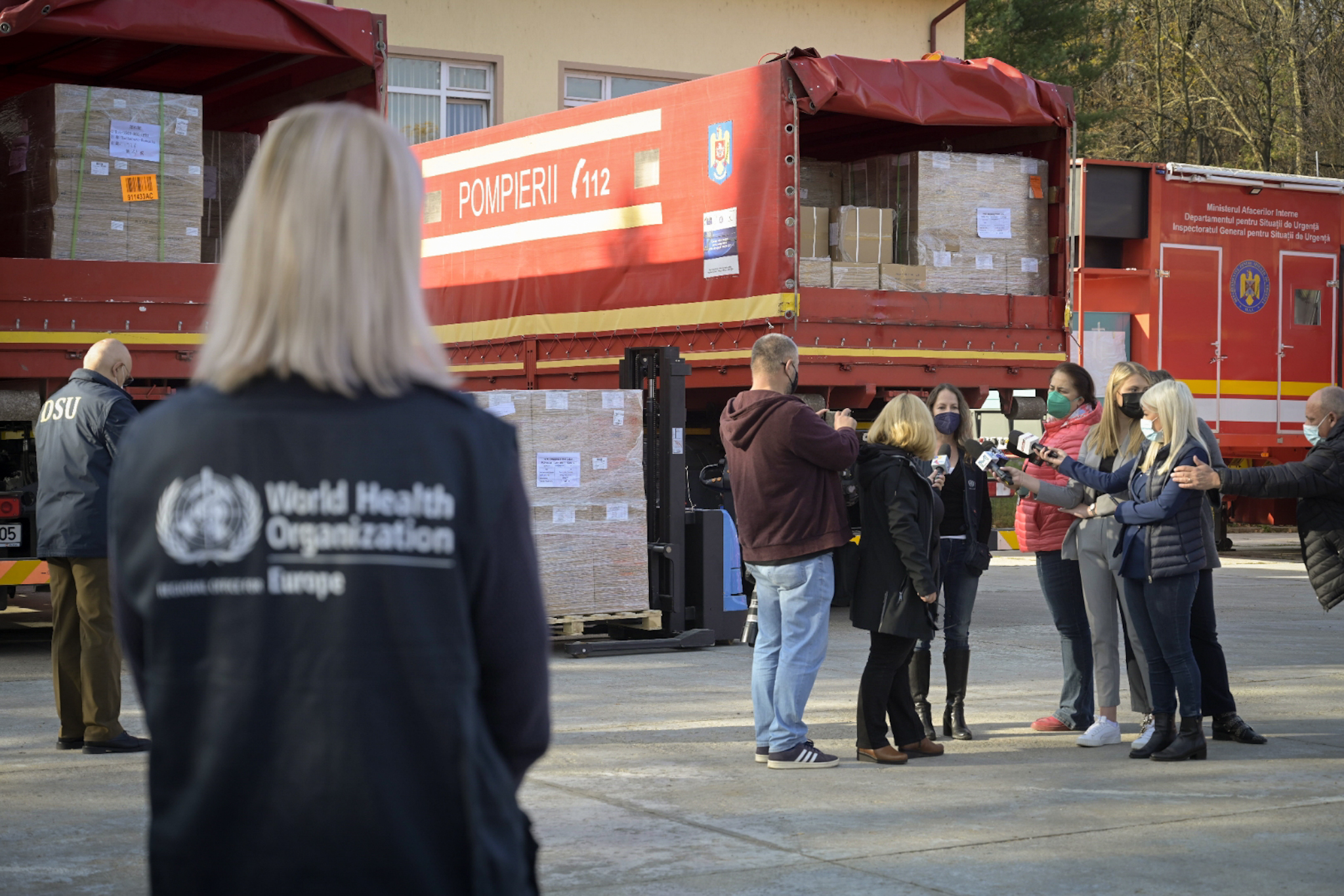Targeted action to save lives: Support to Romania’s COVID-19 response
Like many other countries, Romania was heavily affected by COVID-19 in 2020 and 2021. By the end of February 2022, approximately 2.8 million cases and 64 000 deathswere reported among its population of 19.3 million people.
To reinforce Romania’s COVID-19 pandemic response efforts, WHO provided ongoing strategic, technical, and material support to the Government of Romania. During three months of heightened crisis from November 2021, this support was guided by an in-country COVID-19 Incident Manager. By providing overall coordination of technical, management and operational aspects, the COVID-19 Incident Manager identified needs and actions to mitigate the health impact of COVID-19 on society. Targeted action, including the supply of life-saving medical equipment and supplies, saved countless lives and helped turn the tide of COVID-19 pandemic in Romania.
How did Romania do it, and how did the WHO Secretariat support Romania?
- By strengthening the community health system – Community-based health care has been key to the delivery of essential health services and public health functions in Romania for many years. With over 2000 community health nurses and mediators, the distinct health care delivery and social engagement capacities of community health workers played a critical role in maintaining the continuity of essential health services during the COVID-19 response. To meet increased demand for community-based health services, especially in rural and hard-to-reach areas where travel times to health facilities are high, WHO provided 1833 bicycles and helmets to community health workers to reduce travel times and expand their reach to more patients in need of care. Community health workers were equipped with pulse oximeters, including 1990 oximeter donations from WHO. The community health workforce played a fundamental role in the COVID-19 response by transporting patients to medical consultations, delivering basic commodities (food, medicines, medical/surgical masks, disinfectants), managing self-isolated and quarantined patients, conducting triage in schools, and by serving as members of epidemiological investigation teams. Their role as public health ambassadors was vital for mobilizing the community to vaccinate, especially in rural communities where vaccine uptake was low among at-risk groups.
“I serve a community of 7000 residents across nine villages. Having a bicycle allows me to travel faster, visit more patients and be wherever and whenever I am needed. It is fair to say that this means of transport has really helped me in my work, not just during the global emergency but forever.”
Community health worker
- By building capacity for COVID-19 testing and clinical care at the tertiary level – In November 2021, Romania faced the most severe infection wave since the onset of the pandemic. A record number of cases and intensive care unit hospitalizations overcrowded hospitals, depleted supplies of oxygen, and led to many deaths. To interrupt the chain of SARS-CoV-2 transmission and reduce COVID-19-associated mortality, robust testing, isolation, case management and contact tracing was key. To support the response, WHO provided 34 000 rapid diagnostic tests, 1350 COVID-19 laboratory kits and consumables, and 200 eight-litre oxygen concentrators.
 Photo Credit: © Mihai von Eremia
Photo Credit: © Mihai von Eremia
Photo Caption: COVID-19 Incident Manager supervises WHO delivery of oxygen concentrators, vital equipment in the response to the COVID-19 pandemic.
- By supporting civil society organizations to continue their work – WHO delivered 462 500 medical/surgical masks to Asociatia Carusel, a civil society organization that works with vulnerable groups in Romania, including marginalized populations such as those experiencing homelessness, people living with tuberculosis and HIV, sex workers, and those with substance abuse problems. The delivery of medical/surgical masks enabled the organization to safely continue its health visits and reduce the transmission of the virus.
“During the pandemic, the need for health care workers to visit patients and monitor them at home has become increasingly important. Community health nurses and health mediators are often a person’s first point of contact with the health and social care system. As members of the communities themselves, they have a unique understanding of the neighbourhoods and people that they serve.”
Dr Cassandra Butu
Acting WHO Representative in Romania
WHO’s long-term investments, over two decades, to strengthen Romania’s community health system has reinforced the resilience of communities to respond to health crises such as COVID-19. To buttress Romania’s response to the pandemic, targeted action by WHO, including the supply of life-saving medical equipment and supplies, has saved countless lives and helped turn the tide of COVID-19 pandemic in Romania. Guided by principles of health equity and health system strengthening to ensure the realization of universal health coverage, WHO closely collaborates with the Government of Romania to further strengthen community healthcare systems. Among other activities, the WHO Country Office in Romania provides training for community health system managers and local authorities and serves as a member of the Ministry of Health Working Group on Community Healthcare Strengthening.
